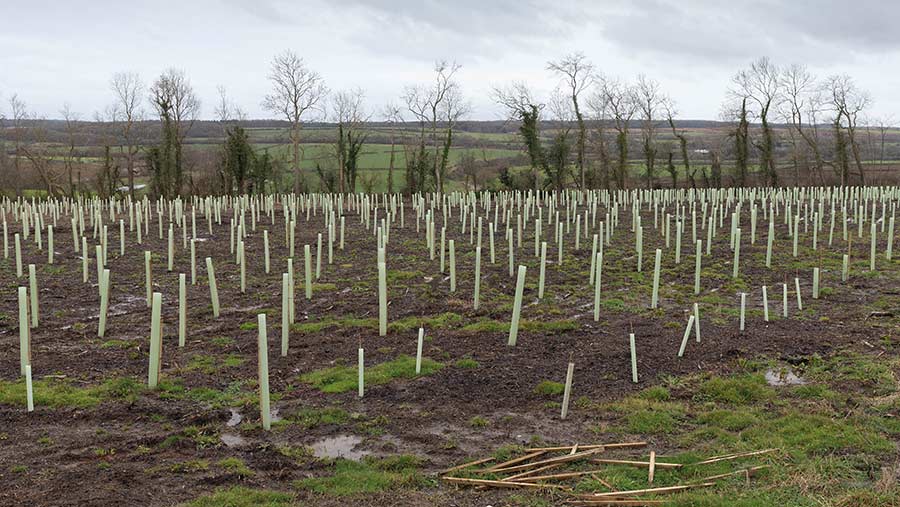More detail on ELM schemes but tenants still fear exclusion
 © Tim Scrivener
© Tim Scrivener Environment secretary George Eustice unveiled further plans at this week’s Oxford Farming Conference for two new Environmental Land Management (ELM) schemes that will pay farmers and landowners to help restore natural habitats.
He told the conference: “Through our new schemes, we are going to work with farmers and land managers to halt the decline in species, reduce our greenhouse gas emissions, increase woodland, improve water and air quality and create more space for nature.”
See also: Opinion: ELM must deliver for trees, biodiversity and farming
The plans include the Local Nature Recovery (LNR) scheme, seen as a more ambitious successor to Countryside Stewardship, which will provide funding to build new habitats, plant trees, and restore peat and wetland areas.
The Landscape Recovery (LR) scheme aims to take a more radical, large-scale approach and fund groups of farmers and landowners to manage schemes that cover 500-5,000ha.
The first wave of applications for 15 projects will open shortly (see “Summary of the two new schemes”).
The new schemes follow the recently announced Sustainable Farming Incentive, the third scheme being developed under ELM, which will fund sustainable farming practices and open later this year.
By the end of the agricultural transition in 2028, Defra expects the government’s £2.4bn annual farm funding pot in England will be split equally among these three schemes, with some money also being invested to improve farm productivity.
Summary of the two new schemes
Local Nature Recovery
The Local Nature Recovery (LNR) is the “improved and ambitious successor” to the Countryside Stewardship scheme in England, according to Defra.
LNR will pay farmers for locally targeted actions that make space for nature in the farmed landscape and countryside, such as creating wildlife habitat, planting trees or restoring peat and wetland areas.
Defra will work with farmers and other experts to design the detailed options during 2022, before the scheme is rolled out in 2023.
More details on the full list of options will be published later this year, alongside scheme rules and proposed payment rates.
Landscape Recovery
The Landscape Recovery (LR) scheme will pay landowners or managers who want to take a more radical, large-scale, and long-term approach to producing environmental and climate outcomes through land-use change and habitat and ecosystem restoration.
LR is open to any individuals or groups who want to come together to deliver large-scale (500-5,000ha) projects.
Defra will launch the application process for the first round of up to 15 pilot projects shortly and this will deliver at least 10,000ha of restored habitat.
Tenant farmers
However, Defra is being challenged to offer urgent solutions to ensure farm landlords cannot exclude tenants from participating in future agri-environment schemes in England.
Tenant Farmers Association (TFA) chief executive George Dunn told Farmers Weekly it was “alarming” that after at least three years of discussions with Defra, it has “no clear plan” for access to LNR and LR by tenant farmers.
The TFA was also disappointed that Defra’s announcement did not contain details of payment rates or application processes.
The TFA has raised concerns with Defra that tenants, especially those on a farm business tenancy (FBT), will be disenfranchised from accessing LNR and LR due to landlords refusing consent.
Mr Dunn also fears some landlords may consider ejecting tenants to access the schemes themselves.
The TFA wants the provisions under the Agriculture Act 2020 that allow Agricultural Holdings Act 1986 (AHA) tenants to object to their landlords unreasonable refusal to allow access to ELM to be extended to FBT tenants.
Second, it says landlords who remove land from tenant farmers should be barred from accessing funding under ELM for a 12-month period.
Mr Dunn most recently raised these solutions with farm minister Victoria Prentis during a meeting in mid-November.
NFU response
The NFU is also concerned that the two new schemes could benefit landowners and fail to protect tenants.
NFU vice-president Tom Bradshaw said: “We’re hearing that some landlords are saying they don’t need tenants and they are going to be putting the land into nature recovery.
“Where does that leave the tenants? If we lose tenants, it would be incredibly short-sighted.”
Defra says it is working closely with the TFA and NFU to ensure tenant farmers wishing to access ELM schemes are not unfairly treated by landlords.
